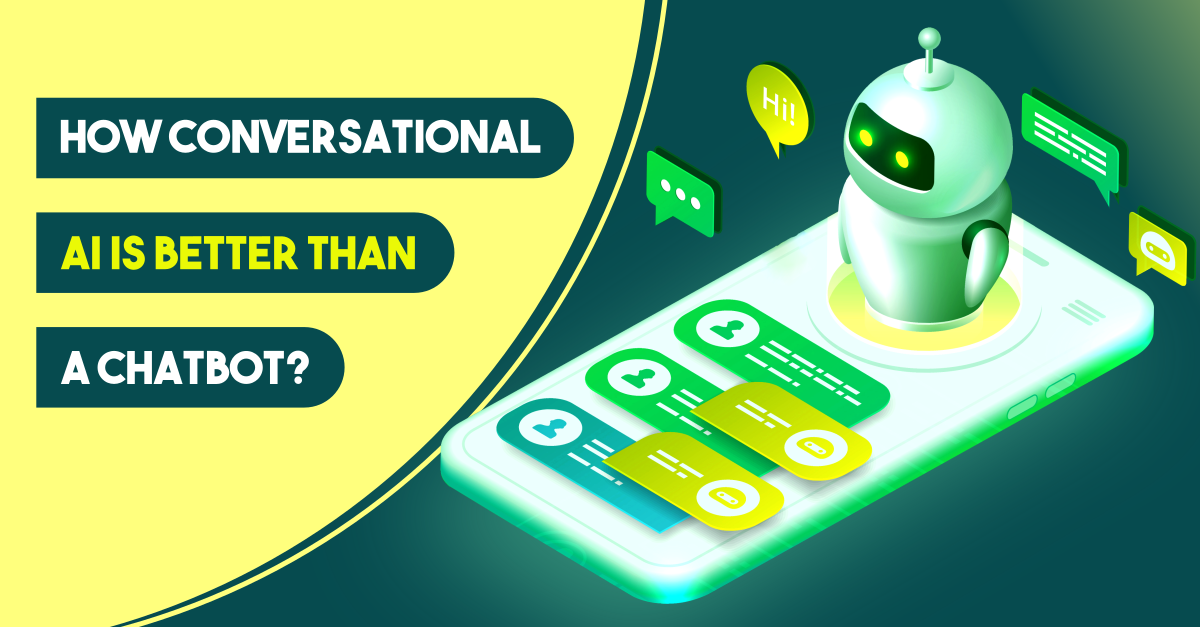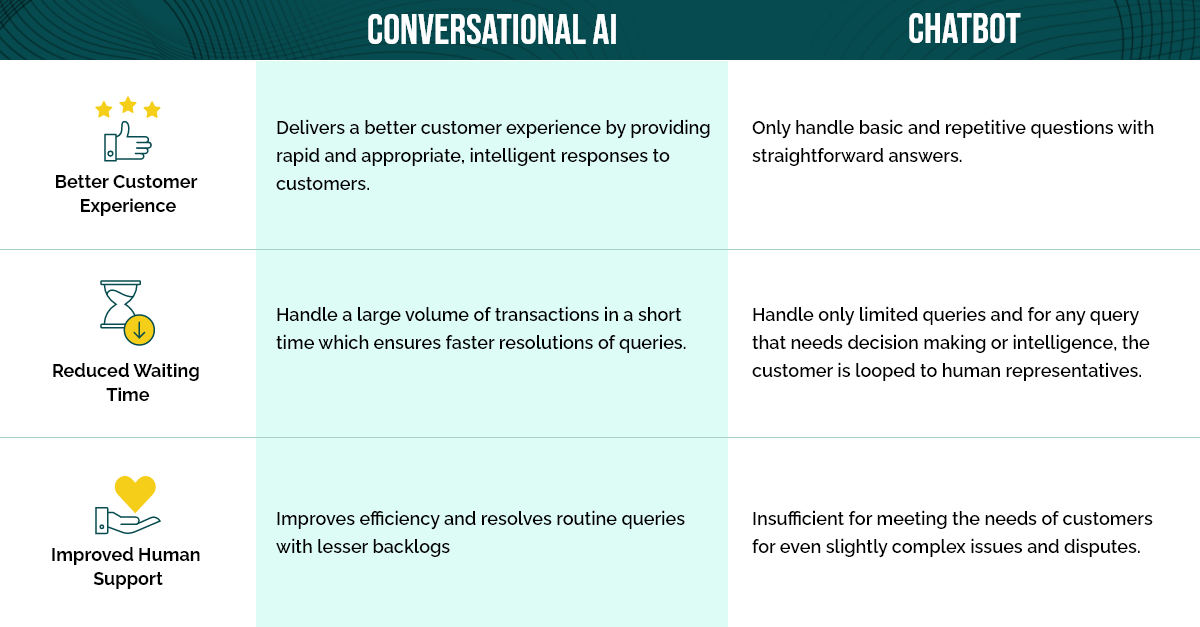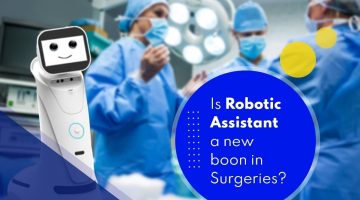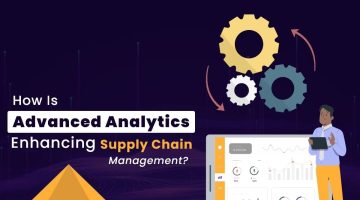How Conversational AI is better than a Chatbot?
 The difference between a Chatbot and a Conversational AI is likened to the difference between knowledge and intelligence. Knowledge can be acquired but you need intelligence to know how and when to apply it. Organizations often get confused between these two buzzwords. Conversational AI is often leveraged to power chatbots to become more effective. However, it is essential to note that not all chatbots are powered by conversational AI.
The difference between a Chatbot and a Conversational AI is likened to the difference between knowledge and intelligence. Knowledge can be acquired but you need intelligence to know how and when to apply it. Organizations often get confused between these two buzzwords. Conversational AI is often leveraged to power chatbots to become more effective. However, it is essential to note that not all chatbots are powered by conversational AI.What is a chatbot?
Chatbots may be defined as software systems that are tightly bound and governed by rules with well-defined categories that automate human interactions, limited to a small set of tasks. They are designed to typically follow rule-based and scripted conversations, based on keywords. They are uncomplicated to build and follow some predefined stream. Most importantly, chatbots are best suited for systems that are menu-based where customers can be asked to choose specific responses so that they can be provided with pre-written answers, for instance, FAQs or other similar requests for fetching information. Chatbots are simple and affordable solutions and a great help to customer service teams that need to answer a large volume of customer queries that have standard template-based answers.What is Conversational AI
With progress in technology, it is now possible to create conversational virtual agents that can provide transactional messaging experiences. Conversational AI, to put it simply, is a form of AI that enables users to communicate with messaging apps, websites, voice assistants, and devices in conversational language via audio, text, and video. It is omnichannel and can be accessed and used through various platforms. Some examples from our daily lives include Cortana, Google Home, Siri, and Amazon Alexa as well as virtual call center agents. Conversational AI platform is based on a combination of Machine Learning (ML), Deep Learning, Natural language processing (NLP), Natural language Understanding (NLU), and predictive analytics and therefore constantly improves itself and learn while conversing with users. They can perform decision-making tasks akin to humans and provide a human touch with their ability to be flexible and also move from one topic to another just like human conversations.Conversational AI vs Chatbots
 In order to meet the requirements of larger organizations like financial institutions, insurance and telecommunications, and healthcare, chatbots need artificial intelligence to enhance their ability to understand human language and perform more complex tasks and transactions. Therefore, companies are shifting to Conversational AI platforms.
In order to meet the requirements of larger organizations like financial institutions, insurance and telecommunications, and healthcare, chatbots need artificial intelligence to enhance their ability to understand human language and perform more complex tasks and transactions. Therefore, companies are shifting to Conversational AI platforms.
Summary Venture7 recommends that companies adopt the two technologies as complementary and utilize them in combination for better customer engagement and customer experience. Human agents can be used much later in the escalation matrix of customer service to handle the most complex of issues and disputes.
Browse by categories
- Agile
- Artificial Intelligence
- Automated testing
- Big Data
- Blockchain
- Business Intelligence
- Chatbots
- Cloud Computing
- Customer Experience
- Data Science
- Design Thinking
- DevOps
- Dialogflow
- Digital transformation
- EduTech
- ETL
- Healthcare
- HealthTech
- Machine Learning
- Mobile application
- Product Development
- Quality Ascent
- Quality Assurance
- Real Estate
- Software Testing
- StartUp
- Testing
You May Like This

Is Robotic Assistant A New Boon In Surgeries?
Hospitals have undergone a rapid change in the way surgeries are done now. Various types of complex surgeries are now being performed with the help of robotics assistant, paving the way for advancements in this sector. Robotics surgery refers to the surgical procedures performed using robotic systems. It is basically a type of minimally invasive […]

Know How Healthcare Sector Gets Benefits From The Data Science Application In Medical Imaging
Over the recent years, the healthcare industry is gaining a lot of momentum due to lot of innovations taking place and accelerating data in a different direction. The use of Data science in healthcare sector, particularly, medical imaging has drastically increased. Data Science is taking the healthcare sector to another level and radiologists are continuously […]

Augmented Reality-The Next Big Thing In Retail Sector
The retail industry works with many aspects of the organization and needs to alter its operations as per the changing dynamics of the business environment. Augmented reality is one such technology that is highly being implemented within the retail industry that has made it possible for consumers to have in-store like experiences and the retailers […]

How Is Advanced Analytics Enhancing Supply Chain Management?
The industries are exploring new technologies to simplify the process of supply chain management and make the process productive. Advanced analytics is one such technology that is highly being implemented to make the supply chain more efficient and optimize the operations. Advanced analytics refers to the process of examining data with the use of sophisticated […]

How Business Intelligence Channelize Multiple Departments In Industries?
The sales and marketing industry is evolving continuously and is moving towards a customer-oriented approach for carrying out their operations. The market is becoming more dynamic with each passing day and industries require a vast amount of sales data for carrying out analytics, reporting, price fixing, negotiations, etc. by studying the trends and customers’ behaviour. […]

How Natural Language Processing Is Benefiting The healthcare Industry?
The healthcare sector is continuously evolving by exploring diverse ways of improving patient care and enhancing the operations of different departments of the healthcare industry. Healthcare providers are shifting towards the use of advanced technologies to simplify various processes by analyzing a wide range of datasets that are gathered from multiple sources. Healthcare professionals are […]



